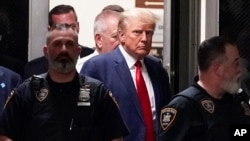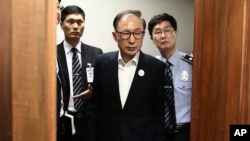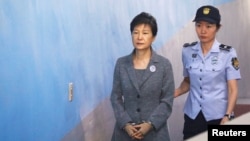Donald Trump, who earlier this month became the first former U.S. president to face criminal charges, says his indictment shows the United States is becoming a "Third World country."
But many countries have prosecuted former presidents, including South Korea, one of Asia’s most vibrant democracies.
Since the 1980s, four South Korean presidents have been jailed after leaving office. Another committed suicide while under investigation. Three have had close family members imprisoned.
Despite such turmoil, South Korea’s democracy has survived – and in many ways even thrived – compared to many of its Western peers, according to some global rankings.
But the possibility that the United States could jail a past president, as South Korea has done, alarms many commentators in Seoul.
“It is unbelievable that something like this is happening in the United States, the birthplace of democracy,” said a recent column in South Korea’s Maeil Business Newspaper.
Pros and cons
For many South Koreans, the main concern is not that Trump was charged with a crime. In fact, opinion polls indicate South Koreans widely dislike Trump, who frequently questioned the value of South Korea’s longstanding alliance with the United States.
The big worry among Koreans is that Trump’s prosecution could lead to a cycle of retribution, in which U.S. politicians use the judicial system to attack their rivals, says Ben Engel, a research professor at the Institute of International Affairs at Seoul National University.
“I think for a lot of people in South Korea, that’s why it’s unhealthy – it’s just this never-ending putting the past on trial rather than thinking about the future,” said Engel, who focuses on U.S.-South Korea relations.
In South Korea, many presidents were targeted only after their foes took office. That pattern appears to have deepened political polarization and created more distrust in government institutions, many observers say.
But not everyone in South Korea focuses on the negatives. After all, it’s not a bad thing to hold politicians accountable for crimes – and there are many obvious examples of South Korean presidents breaking the law, says Kim Min-ha, a Seoul-based political commentator who writes about South Korea's divided political culture.
As examples, he cites former President Lee Myung-bak, who was convicted of taking bribes worth millions of dollars, and ex-President Park Geun-hye, who was jailed for a range of offenses, including corruption and abuse of power.
Few question that South Korean politics can be vicious. But the core elements of the country’s democratic system still function. South Korea routinely holds elections that, although fiercely contested, meet global standards. Those votes are followed by smooth transitions of power.
According to a 2022 survey by the Economist Intelligence Unit, South Korea is a top tier democracy, ranking 24th in the world – six spots ahead of the United States, which was labeled a “flawed democracy.”
Authoritarian past
South Korea is working at a disadvantage. The country overthrew a military dictatorship in the 1980s, giving it only a few decades of experience under the current democratic setup.
That means more bad patterns to break and more misdeeds to punish, says Kim, the political commentator.
For many South Koreans, especially on the left, it also means reforming government institutions such as the country’s powerful prosecution service, which they say has escaped the forces of democratization.
South Korean prosecutors possess vast authority, not only to issue indictments, but to investigate crimes – a job conducted by police in most countries.
Before he left office last year, former South Korean President Moon Jae-in passed legislation stripping prosecutors of some of their investigative powers. The move, he said, was aimed at addressing concerns of “selective justice.”
The long-term impact of Moon's efforts is not yet clear. Conservative lawmakers oppose the changes, saying Moon was only trying to protect himself from future prosecution.
The current government – led by President Yoon Suk-yeol, formerly the country's top prosecutor – has criticized the changes. But Yoon’s conservative party does not have enough seats in parliament to reverse them.
Moving forward
In the view of Kim Su-min, another Seoul-based political analyst who focuses on Korean party politics, the goal should be to create a legal system that allows for investigations of past behavior without any political interference.
“Investigating a former president should not automatically be seen as political retaliation,” Kim says.
Like many Koreans, Kim acknowledges that the current South Korean system is flawed. But he questions whether the U.S. tradition – of always looking forward, never backward – is any better.
“Did the president of the U.S. really never have a single legal issue during their administrations until now?” he asks.
In Kim’s view, Trump’s indictment represents not just a risk but an opportunity to uncover abuses that may have otherwise been ignored.
“The U.S. used to have a mindset of ‘the past is the past, so let’s move on,’” he said. “But now I think Pandora’s box is open,” he added, using a metaphor to describe a source of extensive, unforeseen troubles.
Lee Juhyun contributed to this report.






